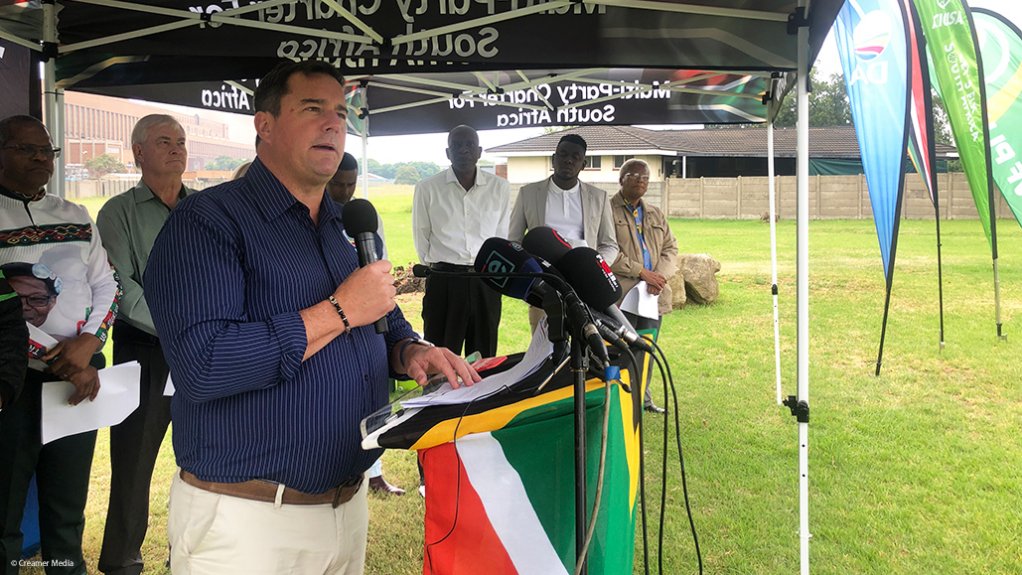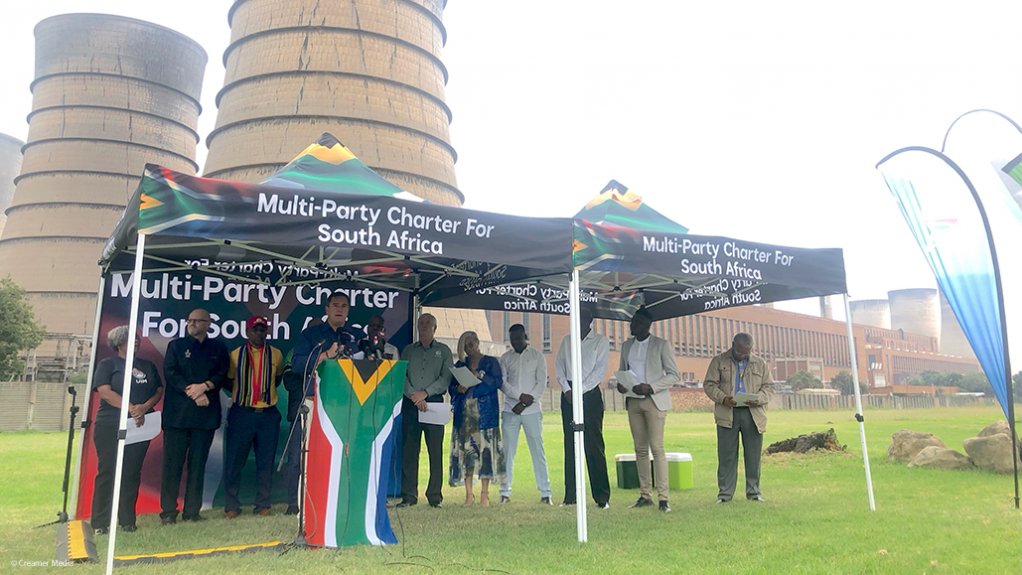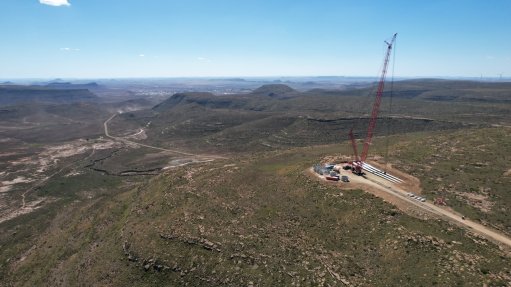Multi-Party Charter reveals its plans to end loadshedding if ANC can be ousted



Watch Engineering News' coverage of the Multi-Party Charter (MPC) for South Africa's briefing on how it plans to end loadshedding, along with an exclusive interview with DA leader John Steenhuisen.
DA leader John Steenhuisen
Photo by Creamer Media
Photo by Creamer Media
The 11 political parties that are members of the Multi-Party Charter (MPC) for South Africa have voiced a unified plan to end loadshedding once and for all if only they could collectively oust ruling party the African National Congress (ANC) at the upcoming national elections on May 29.
The MPC is comprised of the Democratic Alliance (DA), the Inkatha Freedom Party (IFP), the Freedom Front Plus (FF Plus), ActionSA, the African Christian Democratic Party (ACDP), the Independent South African National Civic Organisation, the United Independent Movement (UIM), the Spectrum National Party, Ekhethu People’s Party, the Unemployed National Party and the United Christian Democratic Party.
Speaking at a media briefing at the Kelvin power station, in Kempton Park, on February 28, the leaders of several of the participating parties set out how an MPC-led government could put a decisive end to South Africa’s electricity crisis and achieve energy security so that the economy could begin to revive.
The MPC’s position is that the energy crisis can only be averted through the election of an alternative government with the skill, political will and integrity to fix the problem.
“We need the MPC parties to get over 51% of the vote. You can't do any of this from the opposition bench. So we need the people of South Africa to get behind the MPC to bring us over that finish line.
“That way, we can then start to drive legislative and regulatory changes that will immediately see the opening up of the energy sector to independent power producers, allowing innovators and entrepreneurs to provide feed into the grid,” DA leader John Steenhuisen told Engineering News.
Speaking at the event, IFP president Velenkosini Fiki Hlabisa accused the ANC of destroying South Africa's energy security through three decades of bad policy decisions, lack of planning, State capture, corruption and mismanagement of State-owned utility Eskom.
He said loadshedding had devastated the country’s economy, negatively impacting on economic growth by as much as 3.2 percentage points.
“The national government's inability to create a competitive and modern energy market that is capable of meeting South Africa's energy needs has robbed the South African people years of progress.
“The ANC is 100% responsible for loadshedding, but they want people to be grateful when we are on a lower stage of loadshedding. The notion that rolling blackouts have improved in South Africa thanks to the intervention by the government must be rejected with contempt,” he asserted.
ACDP national secretary general Cherrel Jacobs pointed out that the majority of new electricity generation could not be attributed to the ANC government’s efforts but rather to the efforts of average South African citizens and businesses that have stepped in to compensate and to help solve the energy shortage.
“Every recent round of public procurement of energy has failed to deliver the target megawatts and timelines. The ANC government is unable to deliver on its own targets. [It] is determined to hang on to an old, outdated, failed approach, centralised control of capital spending and procurements, and we all know why they want to keep control.
“It is to enable theft on a massive scale from the people of South Africa – theft to keep the ANC’s patronage networks flowing. This is why Eskom requires regular, massive, endless bailouts,” she said.
Isanco leader Dr Zukile Luyenge added that the MPC was the South African energy sector’s last line of defence – and that of the economy in general.
“Ending loadshedding and ensuring a reliable, affordable power supply for South Africa will be a top priority of an MPC government. We will achieve this by increasing sustainable energy development and creating a competitive energy market that is centred on increased private power generation,” he said.
Luyenge explained that the reversal of South Africa’s energy crisis would be achieved through the MPC’s three-pronged approach.
“One, we need to fix Eskom. Two, we need to establish an open and competitive energy market. Three, we need to enable a just transition to a renewable energy future,” he outlined.
FIXING ESKOM
Steenhuisen explained that MPC’s first step to fixing Eskom would be to expedite the unbundling process to produce a separate transmission company, which will be a standalone grid and market operator.
“This is a fundamentally crucial first step, because a separate, independent transmission company will break Eskom’s monopolistic stranglehold over the grid, enabling an open competitive generation market with a wide and diverse range and variety of energy suppliers, both small and large.
“It is only when the market for energy generation is open and competitive, where we see consumers, households and businesses getting a reliable supply at the most affordable prices,” he noted.
He said this would also open up an entirely new greenfield industry for innovators and entrepreneurs in South Africa to enter the energy space.
“Our second step to fixing Eskom would be to abolish the Ministry of Electricity because its functions can easily be housed within existing Ministries. This Ministry has produced little tangible results towards resolving the electricity crisis. The bulk of the new energy coming into the sector is independent power producers and people going off grid themselves,” Steenhuisen stated.
He said the Ministry had not added any value to date, and that it was simply layering yet another strata of salaries and bureaucracy on top of what already existed, inhibiting the country from being able to get to the real root cause of the problem.
“Our third step to fixing Eskom would be to appoint Eskom and other energy sector leadership boards based on merit. We recognise the urgent need to eliminate political interference in the appointments of the boards and the management of Eskom.
“Therefore, we will decisively end cadre deployment by replacing ANC-connected cronies with experts who are able and committed to fixing Eskom. Not only will South Africa's power stations then begin to operate more efficiently, but we will also see cleaner, more accountable procurement policies being implemented, and it will go a long way towards eradicating corruption in the energy sector,” Steenhuisen said.
He added that the MPC government would ensure that all appointments were made based on experience, skills and qualifications.
“Leadership at Eskom must possess the necessary skills and we are committed to ensuring that all appointees are fit for purpose and can implement the reforms required to begin fixing Eskom, and that their first loyalty lies in getting energy into the grid, and in serving the people of South Africa and not their political masters,” Steenhuisen said.
He said the MPC would further seek to rehire skilled persons who had left Eskom to address the existing skills gaps identified in a skills audit.
“We need now to put the best people up for the job so that we can end loadshedding as soon as possible and start rebuilding our economy, rebuilding our lives and getting energy back into our grid,” he said.
SNP Gauteng chair Justin Shabalala added that the MPC would implement an enhanced financial control framework at Eskom to manage, document, analyse and report transactions.
“Effective financial management planning will aid Eskom to achieve its financial goals, mitigate financial risk and comply with fiduciary duties, corporate governance and due diligence requirements,” he said.
Shabalala explained that a key part of the MPC’s plan would be to invest heavily in the maintenance and upgrading of grid infrastructure. He said this would be achieved through a focus on improving the capacity and reliability of high-voltage transmission infrastructure; significantly investing in maintenance, upgrading and expansion of grid infrastructure; partnering with the private sector to fund and operate such infrastructure; and allowing licensed private companies to build and operate distribution infrastructure.
ESTABLISHING AN OPEN AND COMPETITIVE ENERGY MARKET
ActionSA president Herman Mashaba said the need to establish a truly open and competitive energy market could not be overestimated.
“Competition will drive innovation and investment. It will increase supply, and it will bring down prices,” he said.
Masahaba explained that to enable an open energy market, the MPC aimed to pass the Electricity Regulation Amendment Bill through Parliament to clarify how the future electricity market would operate legally.
“This Bill will assist in establishing a competitive electricity supply, where multiple electricity producers can compete on an open platform. The MPC is committed to the easing of electric energy regulations in general and the reduction of red tape. This is to allow communities to independently find ways and means to produce their own energy without unnecessary regulatory hindrances, while keeping regulations necessary for safety in place,” he said.
Mashaba explained that the MPC would further seek to create a conducive regulatory environment for the construction of microgrids, which he said would reduce costs as they do not require significant transmission infrastructure.
He said these microgrids would primarily be based on renewable energy sources, further helping reduce South Africa's reliance on non-renewable energy sources.
Mashaba said the MPC aimed to facilitate and encourage the wheeling of power between distributed producers and customers through transmission and distribution grids.
“We will do this by approving standard wheeling tariffs to ensure that companies wanting to build power plants know what Eskom or relevant municipalities will charge them to use the grids to remove the power,” he said.
He added that the MPC would also aggressively promote demand side management initiatives to reduce electricity demand.
ENABLING A JUST TRANSITION
FF Plus leader Dr Pieter Groenewald said the MPC aimed to address South Africa's energy generation-related contributions to climate change by first incentivising the rapid rollout of rooftop solar photovoltaic (PV) through feed-in tariffs, tax rebates upon installation and the zero-rating of solar PV panels and components.
He added that a key part of this strategy would be the investment into and the research of various types of new renewable energy technologies within the Department of Science and Innovation.
In addition, Groenewald said that it would be critical to collaborate with domestic and international partners to achieve a rapid and just energy transition from coal to cleaner and more diversified, sustainable energy sources, while retaining and reskilling individuals currently working within the coal sector to ensure that the socio-economic impact on the transition is justly managed.
“It must be emphasised that we are committed to ensuring that this transition does not result in job losses or place the nation's energy security at risk,” he said.
UIM president Neil De Beer emphasised that the MPC was not aiming merely to criticise but to bring workable solutions to the table.
“The MPC does not just look at criticising where the problems are because even a child can tell you the tire of your car is flat. What is more important is to tell you where is the spare tire and where is the wheel nut so that we can change the tire. Unfortunately, this bus that the ANC currently makes logistical moves to fill stadiums, all the tires are flat and there’s just no wheel nut,” he stated.
Comments
Research Reports
Projects
Latest Multimedia
Latest News
Showroom
SBS® Tanks is a leading provider of innovative water security solutions with offices in Southern Africa, East and West Africa, the USA and an...
VISIT SHOWROOMFor over 60 years, VEGA has provided industry-leading products for the measurement of level, density, weight and pressure. As the inventor of the...
VISIT SHOWROOMPress Office
Announcements
What's On
Subscribe to improve your user experience...
Option 1 (equivalent of R125 a month):
Receive a weekly copy of Creamer Media's Engineering News & Mining Weekly magazine
(print copy for those in South Africa and e-magazine for those outside of South Africa)
Receive daily email newsletters
Access to full search results
Access archive of magazine back copies
Access to Projects in Progress
Access to ONE Research Report of your choice in PDF format
Option 2 (equivalent of R375 a month):
All benefits from Option 1
PLUS
Access to Creamer Media's Research Channel Africa for ALL Research Reports, in PDF format, on various industrial and mining sectors
including Electricity; Water; Energy Transition; Hydrogen; Roads, Rail and Ports; Coal; Gold; Platinum; Battery Metals; etc.
Already a subscriber?
Forgotten your password?
Receive weekly copy of Creamer Media's Engineering News & Mining Weekly magazine (print copy for those in South Africa and e-magazine for those outside of South Africa)
➕
Recieve daily email newsletters
➕
Access to full search results
➕
Access archive of magazine back copies
➕
Access to Projects in Progress
➕
Access to ONE Research Report of your choice in PDF format
RESEARCH CHANNEL AFRICA
R4500 (equivalent of R375 a month)
SUBSCRIBEAll benefits from Option 1
➕
Access to Creamer Media's Research Channel Africa for ALL Research Reports on various industrial and mining sectors, in PDF format, including on:
Electricity
➕
Water
➕
Energy Transition
➕
Hydrogen
➕
Roads, Rail and Ports
➕
Coal
➕
Gold
➕
Platinum
➕
Battery Metals
➕
etc.
Receive all benefits from Option 1 or Option 2 delivered to numerous people at your company
➕
Multiple User names and Passwords for simultaneous log-ins
➕
Intranet integration access to all in your organisation





















